



Summary
Brazil in push for GM-free soybean
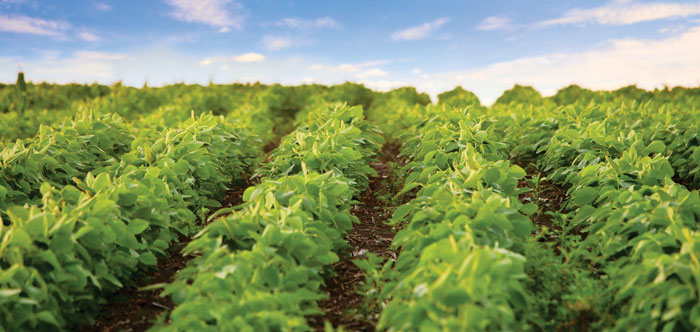
A movement to replace genetically modified (GM) soybean with conventional seeds is gaining traction in Brazil’s largest soybean-producing state of Mato Grosso, as farmers anticipate growing demand from Asia and Europe.
Brazil was an early adopter of transgenic crops and more than 96% of its soybean harvest is of GM varieties, which helped to transform the country into the world’s largest soybean exporter.
Biotech crops, such as corn, soybean and cotton, are genetically modified to resist pests or disease, tolerate drought or withstand sprayings of weed killers like glyphosate, the active ingredient in Monsanto Co’s herbicide.
Wininton Mendes, coordinator of a programme to promote the use of conventional seeds – run by Mato Grosso growers and the government agricultural research agency Embrapa – said doubts about the impact of GM food on human health are a driver behind demand for conventional raw materials.
Proponents of biotech crops say that the technology lowers the cost of food and helps farmers to manage pests and diseases more safely. But some consumers and environmental groups argue that GM crops boost pesticide use and pose threats to the environment and human health.
Mendes said Mato Grosso’s drive to plant more conventional soybean is backed by three trading firms – Amaggi SA, Imcopa International SA and Caramuru Alimentos SA – which pay a premium. The average premium stood at 12 Reais per 60kg bag of GM-free soybean this season.
Reintroduction of conventional soybean creates a niche market for farmers with deep pockets, since non-GM crops require strict controls to avoid contamination during production and shipping, which may raise costs.
Encouraged by the premium paid this season, farmers may plant more non-GM soybean in the next cycle, said Daniel Ferreira, the superintendent of agricultural research agency Imea. However, for many farmers, the difficulty remains the availability of seeds.
An estimated 13.6% of the 2016/17 soybean harvest in Mato Grosso was of the conventional variety. This was down slightly from 15% previously as Brazil’s conventional seeds supply remains low, said Mendes.
Soybean demand from China, a major factor in Brazil’s agricultural expansion, remains strong. However, a consumer backlash there against GM crops is beginning to dent demand for soybean oil, its main cooking oil; this could spell trouble for the crushing industry, which relies on GM soybean from Brazil and the US.
China, which does not grow GM soybean, needs 11 million tonnes of conventional soybean for food production per year, said Lin Tan, an executive at Hopefull Grain & Oil Group. Local farmers cannot supply at least 3 million tonnes of demand from crushers, and the “additional grains must come from somewhere”.
A group of 14 EU countries imported about 2.7 million tonnes of non-GM soybean meal equivalent, according to a 2015 report, and there is potential demand from India, Mendes said.
Brazil’s Agriculture Minister Blairo Maggi said the country needs to step up research to develop conventional seeds for mass production. He cautioned that the government has no funds to promote GM-free soybean production, adding there is space for both kinds in the marketplace.
Source: Reuters, May 11, 2017
Russian soybean oil exports keep up record pace
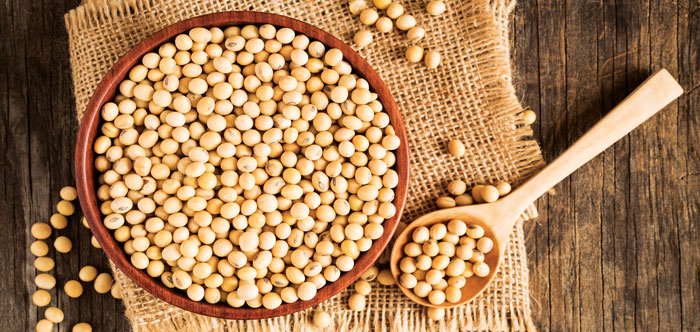
Russia exported 53.8 kilo metric tonnes (KMT) of soybean oil in March – almost 53% more than in the previous month (35.2 KMT) – and up 86% from March 2016. This was the second-biggest shipment after the 63.2 KMT exported last October.
The top importers in the 2016/17 season include Algeria (152.9 KMT or 51% of total exports), Tunisia (32.5 KMT or 11%) and Cuba (29.7 KMT or 10%). China remains a major importer, although it decreased purchases to 28.4 KMT, against 35.5 KMT a year earlier.
In addition, the current season features an expansion of the range of export destinations to countries like Saudi Arabia, Venezuela, Rwanda, Haiti and Yemen.
Source: UkrAgroConsult, May 8, 2017
Malaysia to defend palm oil in Europe
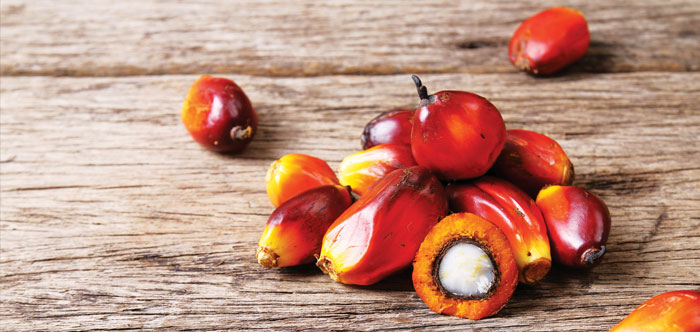
Malaysia remains ready to defend its palm oil industry, following the European Parliament’s support for the ‘Resolution on Palm Oil and Deforestation of Rainforests’.
Plantation Industries and Commodities Minister Datuk Seri Mah Siew Keong said in a statement that the Ministry is ready with credible facts and figures “to face those unfair, biased and distorted allegations about the palm oil industry”.
The Resolution, adopted on April 4, calls on the EU to phase out by 2020 the use of vegetable oils – including palm oil – in biodiesel, if produced in an unsustainable way that leads to deforestation. It also wants a single EU-led certification scheme to be drawn up for palm oil.
At the 30th ASEAN Summit in Manila in late April, leaders issued a statement urging the EU to recognise the palm oil sustainability certification schemes of the region’s producer countries. They noted that these government-led schemes also demonstrate ASEAN’s commitment to the UN’s Sustainable Development Goals.
Mah said the region’s palm oil industry supports the livelihood of 3.5 million smallholders, mainly in Malaysia, Indonesia and Thailand.
The EU imports between 7 million tonnes and 7.5 million tonnes of palm oil annually. Last year, Malaysia accounted for 29.4% of the imports, while Indonesia supplied 48.6%. Malaysian palm oil exports to the EU were valued at RM9.9 billion.
On April 5, Datuk Seri Mah had said that Malaysia and Indonesia would team up to convince European Parliament lawmakers that the two countries are already taking steps to ensure that oil palm production activities do not harm the environment.
“We know that the global community is concerned about the environment and deforestation, but it is unfair just to target palm oil […] . We want to be given a chance to address the lawmakers […] as to why we feel the resolution is unfair to palm oil,” he said.
The minister said he would also fight for the EU to recognise the Malaysian Sustainable Palm Oil certification scheme. All plantations must be certified by December 2018. Estates and smallholdings have until June and December 2019 respectively, to achieve certification.
Sources: Bernama, May 4, 2017; The Star Online, April 6, 2017
Labour shortage in Malaysian oil palm plantations
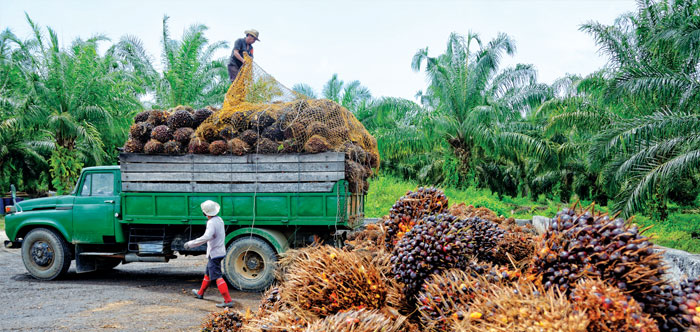
Malaysian oil palm planters are bracing for a severe labour shortage, with Indonesian workers staying away due to the weaker Ringgit and increased opportunities at home. This could delay harvests and curb output, as extraction rates fall when fruit is picked late.
About 70% of the workforce in the Malaysian oil palm industry comes from Indonesia. But the Ringgit has plunged in value, falling 15% against the Indonesian Rupiah since the start of 2015.
That, along with increased demand for labour in Indonesia as new plantations open there, is cutting the number of workers prepared to head for Malaysia, planters said. Some also cited tighter employment regulations in Malaysia, with stricter Immigration procedures for foreign workers.
“This year, output will be impacted by [the shortage of] workers,” said Datuk Zakaria Arshad, chief executive of Felda Global Ventures Bhd, one of Malaysia’s largest oil palm plantation operators. “Workers are more difficult to get now, especially from Indonesia.”
Plantation workers usually make little more than the minimum wage, which is about RM1,000 in Peninsular Malaysia and 3.35 million Rupiah in Indonesia.
Indonesia is the world’s top producer of palm oil, churning out 31.8 million tonnes last year. Malaysia produced 17.3 million tonnes.
Source: Reuters, April 8, 2017
Pacts to promote Malaysian palm oil in India
The Malaysian Palm Oil Council has signed pacts with two bodies in India – the Solvent Extractors Association and the Mumbai Dabbawala Association – to extend acceptance of palm oil among food manufacturers and consumers.
The memorandum of understanding (MoU) with each was exchanged in the presence of Malaysian Prime Minister Datuk Seri Najib Abdul Razak, a statement said. It aims at educating consumers on the nutritional and health properties of Malaysian palm oil, as well as its uses.
With their outreach to consumers by way of distribution of daily meal-boxes, the Dabbawalas are in a unique position to assist the MPOC in enhancing the image of Malaysian palm oil, the statement said.
Source: Press Trust of India, April 3, 2017
India set to boost oil palm cultivation
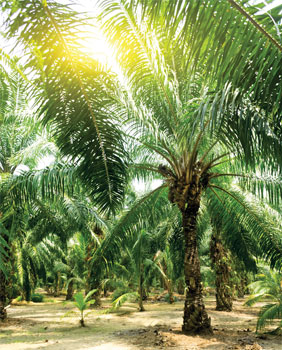
India’s government has relaxed the land ceiling for oil palm cultivation under the National Mission on Oilseeds and Oil Palm (NMOOP). The aim is to attract farmers and corporate bodies to boost output and cut imports.
Domestic production of edible oils stands at about 9 million tonnes, while demand is around 25 million tonnes. The gap is met through imports, valued at Rs 68,000 crore in 2015-16. Palm oil contributes 70% of the vegetable oil imports.
The Cabinet also revised norms for assistance under Mini Mission-II of the NMOOP. It approved revisions in assistance for planting materials, maintenance costs, inter-cropping costs and bore-wells. All this is intended to make investment in oil palm plantations more attractive and to help utilise waste land.
This programme is being implemented in 12 states – Andhra Pradesh, Karnataka, Tamil Nadu, Mizoram, Odisha, Kerala, Assam, Telangana, Chhattisgarh, Gujarat, Arunachal Pradesh and Nagaland. Nearly 133 districts are under oil palm cultivation in these states.
There will be some financial implications in relaxing restrictions on the acreage and upscaling the norms of subsidies, but this will be accommodated within the NMOOP fund, a statement said.
The government has promoted oil palm planting since 1986-87. From 2014-15, this was done via the NMOOP. The planted area has expanded from 8,585 ha in 1991-92 to about 3 lakh ha in 2015-16. An additional 1.3 lakh ha is planned to be cultivated in 2016-17.
Source: Press Trust of India, April 12, 2017
Benefits from Brexit for Malaysian palm oil?

Malaysia’s food-based exports, especially palm oil, could reap trade opportunities through the changes created by the UK’s departure from the EU.
Glenreagh Sdn Bhd Managing Director Nordin Abdullah expects better opportunities for Malaysian companies with the capacity to operate in highly-regulated and competitive environments.
“It is no secret that certain countries in the EU are less receptive to imports of palm oil for protectionist reasons. Malaysia can now [re-examine how it deals] with the issue, as regulations and attitudes can change post the UK’s departure,” he said in a statement today.
Nordin said that, in the short-term, both the UK and EU economies will be competing for trade and investments with external parties.
In February, Malaysia’s exports of palm oil to the EU and the UK stood at 153,165 tonnes and 1,759 tonnes respectively.
Source: Bernama, March 30, 2017
MSPO-certified palm oil for Europe by year-end
Malaysia will send its first consignment of domestically-certified palm oil to Europe by the end of the year, said Minister of Plantation Industries and Commodities Datuk Seri Mah Siew Keong.
Malaysia’s target is to send 5 million tonnes of certified oil to Europe by 2019. The industry will also continue to engage with European buyers, he told a press conference.
He said that mandatory implementation of the Malaysian Sustainable Palm Oil (MSPO) standard by December 2019 is a move towards branding the output as being sustainably-produced and safe.
The government plans to organise more than 100 nationwide briefings on the MSPO up to next year, to enhance awareness among the 550,000 smallholders.
Source: Bernama, Feb 28 & March 30, 2017
Drop expected in India’s vegetable oil imports
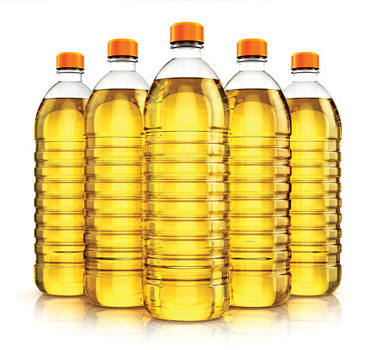
India’s booming edible oils imports are expected to decline or hold flat in the year to October 2017, failing to grow for the first time in six years as near-record domestic oilseeds output boosts supplies, industry executives said in Kuala Lumpur.
India, the world’s biggest edible oils importer, is expected to purchase about 14-14.5 million tonnes of vegetable oils this year, compared to 14.5 million tonnes in 2015/16.
“We are going to have an additional [1.2] million tonnes of edible oils this year because of higher soybean production last year, and expectations of a bumper rapeseed crop which will be harvested in the coming months,” said Sandeep Bajoria, chief executive of Mumbai-based brokerage Sun Win Group.
India’s edible oils purchases – mainly palm oil from Malaysia and Indonesia and soybean oil from Argentina – have risen each year since 2010/11, according to US Department of Agriculture data. The imports have grown at an average of 11% a year.
India’s soybean crop, harvested in October, rose to 11.5 million tonnes, up from 7 million tonnes a year ago. This was the biggest annual output jump in more than a decade, boosting supplies and dragging down prices.
Rapeseed production is forecast to rise to 7 million tonnes, from 5.8 million tonnes a year ago, Bajoria said.
India’s soybean oil imports are expected to decline to 3.4 million tonnes from 4.3 million tonnes a year ago. However, palm oil imports are forecast to rise to 8.8 million tonnes this year from 8.4 million tonnes last year.
Source: Reuters, March 6, 2017
Indonesia seeks better productivity in oil palm planting
The Indonesian Palm Oil Board (DMSI) – an umbrella organisation of the country’s main palm oil associations – says higher productivity will be the key to boosting CPO production.
Amidst international pressure, particularly after the devastating forest fires in Sumatra and Kalimantan in the second half of 2015, President Joko Widodo had announced a five-year moratorium on new concessions in order to limit the expansion of oil palm plantations.
Although the authorities want higher CPO output to safeguard foreign exchange earnings and create employment opportunities, further growth should come on the back of rising productivity, not by adding new plantations.
DMSI Chairman Derom Bangun said higher productivity should be achieved by replanting. Currently, the average production is close to 3.7 tonnes/ha/year. This should be raised to at least 5 tonnes/ha/year. The estimated maximum (perfect) productivity is 9 tonnes per ha, but this is considered too difficult to achieve.
Without higher productivity, the moratorium will curtail growth of the palm oil industry, both in terms of production and plantation size. Bangun said the sector had expanded by 13-15% per year in the 1990s, in production and plantation size. However, over the past couple of years, growth had fallen to 5-8% per year.
The palm oil sector is one of the key foreign exchange earners for Indonesia and provides employment to millions, especially in Sumatra and Kalimantan.
Indonesia’s oil palm plantation size is currently estimated at 11 million ha. Bangun said that, if productivity can be raised to 6 tonnes/ha/year, then CPO production would nearly double to 66 million tonnes per year.
The Indonesian Palm Oil Association said CPO production recorded 34.5 million tonnes in full-year 2016, down 3% from 35.5 million tonnes the previous year. The drop was due to the impact of the El Nino phenomenon, which brought dry weather to Southeast Asia in 2015.
Source: www.indonesia-investments.com, Feb 18, 2017
RM50mil R&D boost for Malaysia’s palm oil sector
Malaysia has allocated RM50 million to develop the quality of its palm oil, said Plantation Industries and Commodities Minister Datuk Seri Mah Siew Keong.
The money will be disbursed as matching grants for research and development to improve the safety and quality of Malaysian palm oil and derived products.
“R&D will be done on a joint-venture basis with the private sector,” he said, noting that the scientific research will focus on eliminating contaminants in palm oil.
He said palm oil is already safe in terms of nutritional value, and that research would make it even better.
Malaysian-owned palm oil mills and refineries based in the country will be eligible to apply for funds via the allocation.
Source: The Star Online, March 8, 2017
These are edited versions of the articles.